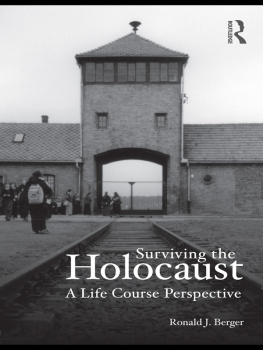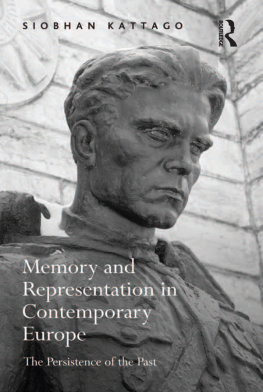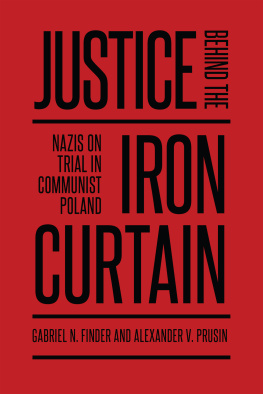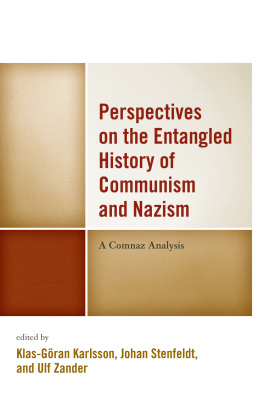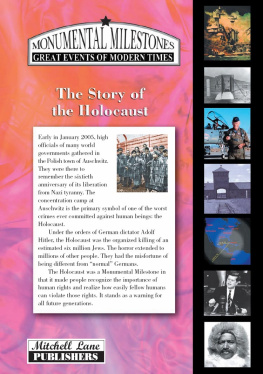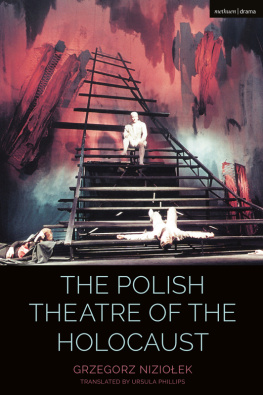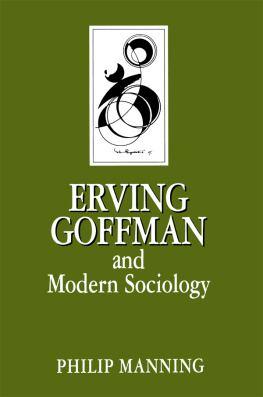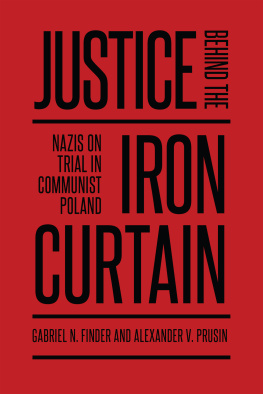
Contemporary Auschwitz/Owicim
This book presents an innovative theoretical and empirical approach to the present attributions of meaning to the past. Based on the authors fieldwork in the contemporary Polish town of Owicim Auschwitz, in German it observes the manner in which residents remember and narrate the past of their town, drawing on theoretical perspectives from the work of figures such as George Herbert Mead and Erving Goffman. With attention to narratives concerning pre-war CatholicJewish coexistence, wartime Nazi occupation, the Holocaust and post-war Communist Poland, the author explores the complementary, fluid and contradictory nature of meaning-making processes in various contemporary interactional contexts, both online and offline. As such, it will appeal to social scientists with interests in memory studies, the Holocaust and interactional sociology.
Thomas Van de Putte is a post-doctoral fellow in the Department of Sociology and Social Research at the University of Trento, Italy.
Memory Studies: Global Constellations
Series editor:
Henri Lustiger-Thaler, Ramapo College of New Jersey, USA and Ecole des Hautes Etudes en Sciences Sociales, France
The past in the present has returned in the early twenty-first century with a vengeance, and with it the expansion of categories of experience. These experiences have largely been lost in the advance of rationalist and constructivist understandings of subjectivity and their collective representations. The cultural stakes around forgetting, useful forgetting and remembering, locally, regionally, nationally and globally have risen exponentially. It is therefore not unusual that migrant memories; micro-histories; personal and individual memories in their interwoven relation to cultural, political and social narratives; the mnemonic past and present of emotions, embodiment and ritual; and finally, the mnemonic spatiality of geography and territories are receiving more pronounced hearings.
This transpires as the social sciences themselves are consciously globalizing their knowledge bases. In addition to the above, the reconstructive logic of memory in the juggernaut of galloping informationalization is rendering it more and more publicly accessible, and therefore part of a new global public constellation around the coding of meaning and experience. Memory studies as an academic field of social and cultural inquiry emerges at a time when global public debate buttressed by the fragmentation of national narratives has accelerated. Societies today, in late globalized conditions, are pregnant with newly unmediated and unfrozen memories once sequestered in wide collective representations. We welcome manuscripts that examine and analyze these profound cultural traces.
Titles in this series
19. How Memory Divides
The Search for Identity in Eastern Germany
Jeremy Brooke Straughn
20. The Politics of Memory in Poland and Ukraine
From Reconciliation to De-Conciliation
Edited by Tomasz Stryjek and Joanna Konieczna-Saamati
21. Commemorating Muslims in the First World War Centenary
Making Melancholia
Meghan Tinsley
First published 2022
by Routledge
2 Park Square, Milton Park, Abingdon, Oxon OX14 4RN
and by Routledge
605 Third Avenue, New York, NY 10158
Routledge is an imprint of the Taylor & Francis Group, an informa business
2022 Thomas Van de Putte
The right of Thomas Van de Putte to be identified as author of this work has been asserted by him in accordance with sections 77 and 78 of the Copyright, Designs and Patents Act 1988.
All rights reserved. No part of this book may be reprinted or reproduced or utilised in any form or by any electronic, mechanical, or other means, now known or hereafter invented, including photocopying and recording, or in any information storage or retrieval system, without permission in writing from the publishers.
Trademark notice: Product or corporate names may be trademarks or registered trademarks, and are used only for identification and explanation without intent to infringe.
British Library Cataloguing-in-Publication Data
A catalogue record for this book is available from the British Library
Library of Congress Cataloging-in-Publication Data
Names: Putte, Thomas van de, author.
Title: Contemporary Auschwitz/Oswiecim : an interactional, synchronic approach to collective memory / Thomas Van de Putte.
Description: 1 Edition. | New York, NY : Routledge Books, 2022. |
Series: Memory studies: global constellations | Includes bibliographical references and index.
Identifiers: LCCN 2021017069 (print) | LCCN 2021017070 (ebook) | ISBN 9780367697280 (hardback) | ISBN 9780367697310 (paperback) | ISBN 9781003143017 (ebook)
Subjects: LCSH: Collective memory--Poland--Oswiecim. | Social psychology--Poland. | Auschwitz (Concentration camp) | Narration (Rhetoric)--Social aspects--Poland. | Oral interpretation--Poland--History
Classification: LCC HM1027.P7 P88 2022 (print) | LCC HM1027.P7 (ebook) | DDC 940.53/1853862--dc23
LC record available at https://lccn.loc.gov/2021017069
LC ebook record available at https://lccn.loc.gov/2021017070
ISBN: 978-0-367-69728-0 (hbk)
ISBN: 978-0-367-69731-0 (pbk)
ISBN: 978-1-003-14301-7 (ebk)
DOI: 10.4324/9781003143017
I must first thank the people who supervised and mentored me as a student throughout the years. This book is inspired by their teaching and the many hours of conversation I had with them over the years. At Kings College London, Jessica Rapson and Richard Ned Lebow taught me the fundaments of memory studies and interactional sociology. From Martin Reisigl, at the University of Bern, I learned pragmatics and critical discourse analysis. Anton Pelinka and Karin Liebhart (Central European University) and Arjan Van Dixhoorn and Gita Deneckere (University of Ghent) taught me how to think and write as a scholar.
I would also like to thank some scholars in memory studies who have greatly contributed to this book. First of all, my PhD examiners, Sarah Gensburger and Wulf Kansteiner. I have benefited from their feedback and critique. I am also grateful to the members of the Cultural Memory Reading Group at Kings College London, and especially Taylor Annabell, Andong Li and Lauren Cantillon for their many stimulating thoughts and the chances they offered me to discuss my work. I also thank my colleagues at the University of Trento, Valentina Marcheselli, Andrea Cossu and Giuseppe Sciortino, for their encouragement during the writing of the manuscript.
I should also thank my grandmother, Lydie Janssens, for her unconditional care and support.
Finally, I am grateful to my family, Ola and Hannah, for their patience, inspiration and love.
DOI: 10.4324/9781003143017-1
In the spring of 2014, I was travelling by train in Poland. The train departed in Katowice, an industrial city in Southern Poland, and arrived in the town of Owicim, a town better known by its German name Auschwitz. Neither Katowice nor Auschwitz/Owicim were my final travel destination, but on the seats next to mine two teenage girls were travelling home, to Auschwitz/Owicim. Like so many others, I enjoy overhearing other peoples conversations when travelling on public transport. The conversation between the two girls was one that could have happened anywhere else, but the reaction it triggered for me highlights the complexity of different levels of meaning attributed to Owicim and Auschwitz in various contexts. One moment, one girl asked the other: Do you know why I would never like to live in Owicim when I am a grown-up? I expected complaints about the stigma the town and its 40,000 inhabitants carry, and about the big numbers of tourists visiting the former extermination sites. But the answer was more striking: Because there are too many mosquitos.


